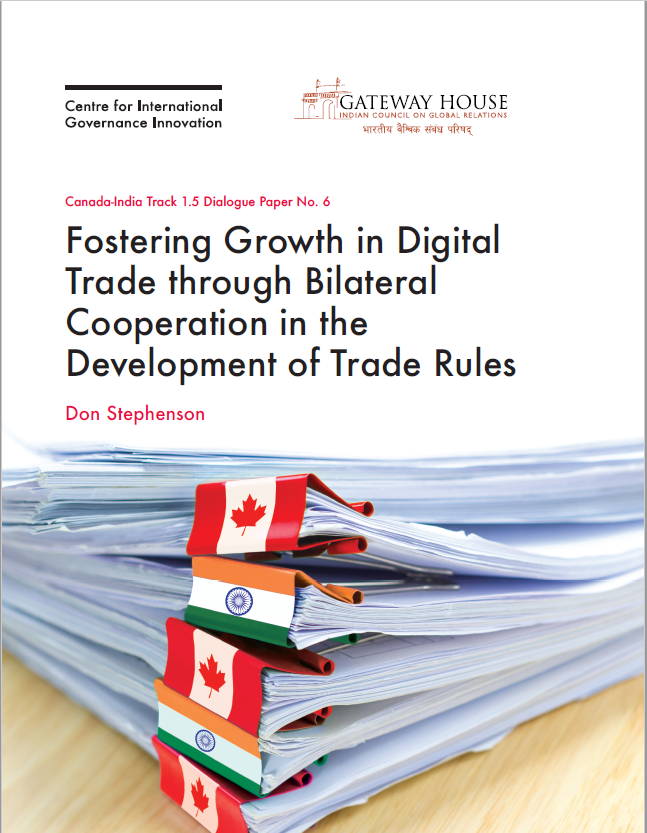This paper is part of the India-Canada Track 1.5 Dialogue.
India-Canada Track 1.5 Dialogue on Innovation, Growth and Prosperity is a collaboration between Gateway House: Indian Council on Global Relations and the Centre for International Governance Innovation (CIGI).
The India-Canada Track 1.5 Dialogue works jointly on multilateral issues and identifies areas where improved cooperation could benefit both countries. To address these challenges, the papers produced under this partnership will help to develop policy recommendations to promote innovation and navigate shared governance issues that are integral to the continued growth of Canada-India bilateral relations.

This paper is part of the India-Canada Track 1.5 Dialogue. View the first, third and fourth part of this four-part paper series.
Executive Summary
Trade is important for both Canada and India. For Canada, as an industrialized economy endowed with enormous resource gifts but a small domestic market, trade is essential. Trade represents a large share of the economy and makes an important contribution to Canadians’ high standard of living. For India, while it is less dependent on trade due to a much larger domestic market, expanding exports and attracting investment are essential to sustain rapid economic growth, and to create jobs and economic prosperity for a large and growing labour force.
Trade is changing. Technology has been the principal driver of trade growth, through improvements in production, transportation and communications. Growth in communications capacity and decreases in the cost of computing have altered traditional economic development and, together with the internet, created the foundations for the most recent tectonic shift in the nature of business and trade – the emergence of an economy, in which the most important resource is data.
In trade policy fora, the digital economy is most often viewed from the perspective of electronic commerce — goods and services purchased and sold over electronic networks. However, the digital economy — including digital trade — is much more than electronic commerce. The digital trade agenda is a subset of the broader digital governance universe, which spans issues of infrastructure, internet administration and myriad economic and social policy issues and involves innumerable stakeholders.
India and Canada have important commercial interests in digital trade, and both have counterbalancing social policy concerns, but they have important differences as well. The data-driven economy is expected to not only increase trade in services but also may reduce employment in manufacturing; it is also expected to shift the demand for services from business process outsourcing to higher-skill work. A resulting loss of tariff revenue is more meaningful for India, where it represents five percent of general government revenues, as compared with Canada, where it represents less than two percent. The potential loss of jobs and a shift in services exports will also have a greater impact on India due to its reliance on services exports and the massive growth of its domestic labour force.
You can download the PDF version of this paper here.
Don Stephenson is the Former Chief Trade Negotiator, India-Canada Comprehensive Economic Partnership Agreement.
This paper was exclusively written for Gateway House: Indian Council on Global Relations. You can read more exclusive content here.
For interview requests with the author, or for permission to republish, please contact outreach@gatewayhouse.in.
© Copyright 2020 Gateway House: Indian Council on Global Relations. All rights reserved. Any unauthorized copying or reproduction is strictly prohibited.